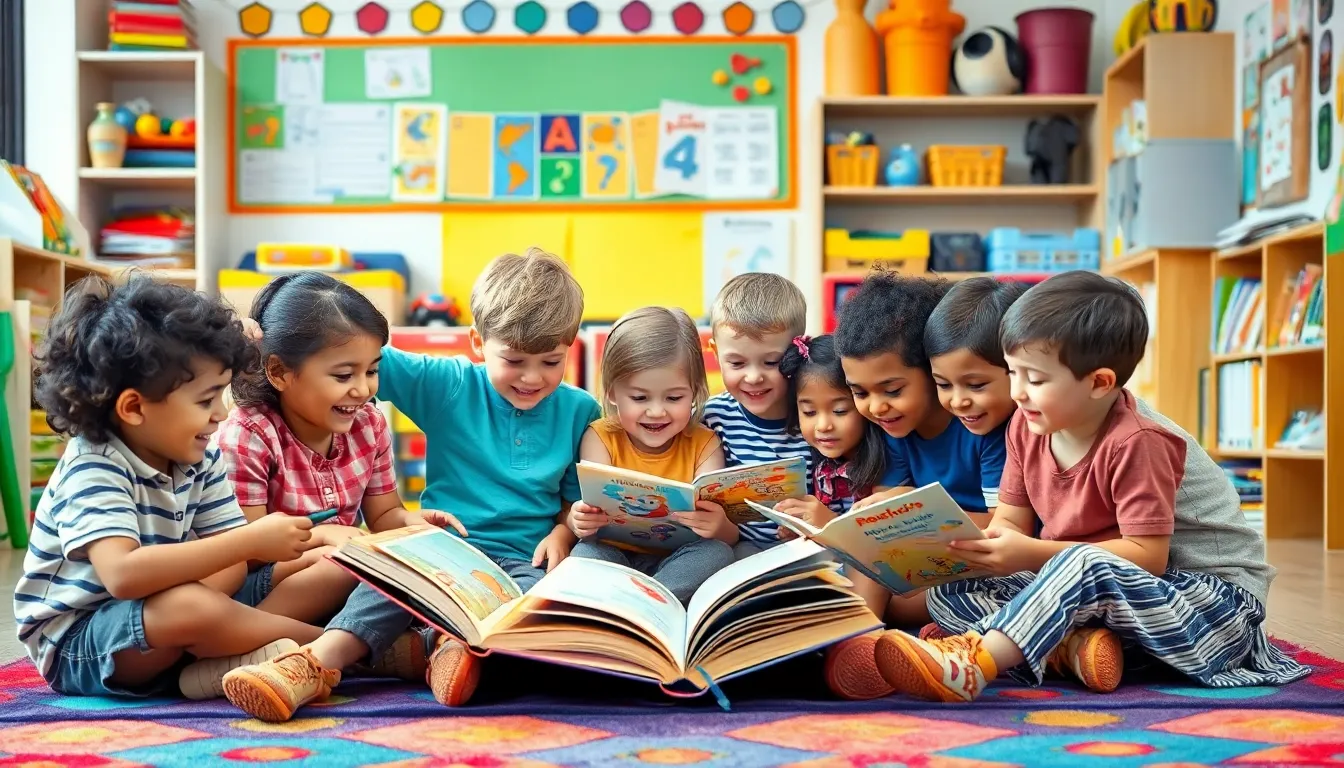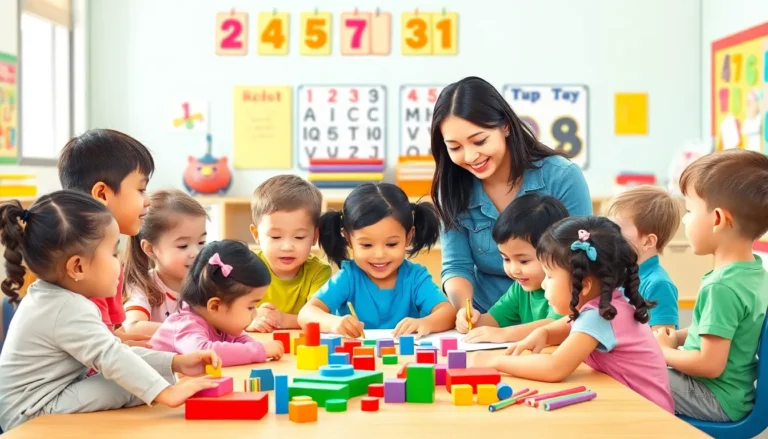Table of Contents
ToggleIn today’s fast-paced world, ensuring children are ready to read is more crucial than ever. Reading readiness lays the foundation for academic success, shaping a child’s future learning experiences. It encompasses a blend of skills, knowledge, and attitudes that prepare young learners for the journey ahead.
Parents and educators play a vital role in fostering this essential skill. By understanding the key components of reading readiness, they can create supportive environments that nurture a love for reading. From phonemic awareness to vocabulary development, recognizing these elements can make a significant difference in a child’s literacy journey. Embracing reading readiness not only enhances comprehension but also boosts confidence, paving the way for lifelong learning.
Understanding Reading Readiness
Reading readiness involves the skills and knowledge children require to start reading proficiently. It encompasses various components essential for developing literacy.
Defining Reading Readiness
Reading readiness reflects a child’s preparedness to learn reading through several foundational skills. Key components include phonemic awareness, the ability to recognize sounds in spoken words, and alphabet knowledge, which is the understanding of letters and their corresponding sounds. Other critical areas are vocabulary acquisition, comprehension skills, and print awareness, which is the recognition of how written language functions. By nurturing these skills, educators and parents can promote a smoother transition into reading.
Importance of Reading Readiness
Reading readiness holds significant importance in a child’s academic success. Early proficiency in literacy skills correlates with long-term educational achievements and shapes a child’s confidence in learning. When children develop reading readiness, they experience enhanced comprehension abilities, leading to improved performance in other subjects. Additionally, fostering a love for reading during this critical period encourages lifelong learning. Research consistently shows that children who possess strong reading readiness skills perform better academically and possess greater overall cognitive development.
Factors Influencing Reading Readiness

Several factors influence reading readiness, including child development stages and environmental factors. Understanding these elements helps parents and educators support children effectively.
Child Development and Reading Skills
Child development plays a crucial role in reading readiness. Cognitive skills such as memory, attention, and processing speed impact learning abilities. Physical skills, including fine motor skills, enable children to manipulate books and writing tools effectively. Social-emotional skills also matter; children who can express emotions and interact positively with peers are more likely to engage with reading materials.
Developmental milestones can vary, but key skills emerge around specific ages. For example, phonemic awareness often develops between three and five years. Vocabulary growth typically occurs during early childhood, with children acquiring new words at a rapid pace. Each of these skills contributes to overall reading abilities, preparing children for formal literacy instruction.
Environmental Influences
The environment significantly shapes a child’s reading readiness. Exposure to print-rich environments, such as homes filled with books, can foster a love for reading. Early interactions with parents or caregivers, through reading aloud and discussing stories, promote vocabulary and comprehension skills.
Access to educational resources also affects reading readiness. Quality early education programs enhance literacy skills through structured activities that engage children. Community resources like libraries and literacy programs provide further opportunities for learning. Consistent encouragement and support from family and community members create a solid foundation for literacy development, preparing children for future academic success.
Strategies for Promoting Reading Readiness
Promoting reading readiness requires active strategies from both parents and educators. These approaches can significantly enhance children’s literacy development.
Parental Involvement
Parental involvement plays a crucial role in fostering reading readiness. Engaging children in regular reading routines strengthens their skills and interest. Parents can encourage reading by:
- Reading together daily: Establish a consistent time for reading to cultivate a habit.
- Choosing diverse materials: Introduce various genres and formats, including picture books, comics, and educational games.
- Asking questions: Use open-ended questions about stories to enhance comprehension and critical thinking.
- Creating a reading-friendly environment: Set up cozy reading nooks with easy access to books, stimulating a love for reading.
Active participation from parents leads to increased vocabulary, improved comprehension, and a lifelong appreciation for books.
Educational Programs
Educational programs provide structured support for promoting reading readiness. These initiatives focus on essential literacy skills through:
- Literacy-focused curricula: Implement programs that integrate phonemic awareness, vocabulary building, and comprehension exercises into early education settings.
- Workshops and training: Offer professional development for educators, equipping them with effective strategies for teaching reading readiness.
- Community literacy events: Organize reading festivals or book fairs that incentivize children to engage with books in fun environments.
- Screening and assessment tools: Utilize assessments to identify children who may need additional support, enabling targeted interventions.
Such educational initiatives create a robust framework that aids in the development of children’s literacy skills, empowering them for future academic success.
Assessing Reading Readiness
Assessing reading readiness involves using specific tools and techniques to gauge children’s literacy skills. Early identification of reading capabilities helps tailor learning experiences to meet individual needs.
Tools and Techniques
- Checklists: Implement checklists that list key skills such as phonemic awareness, alphabet recognition, and vocabulary comprehension to track progress.
- Standardized Tests: Use standardized reading assessments designed for preschool and early elementary children to measure literacy skills against a benchmark.
- Observational Assessments: Conduct observational assessments during storytime or reading activities, observing children’s interactions with books to assess comprehension and engagement.
- Invented Spelling: Analyze children’s invented spelling to evaluate their understanding of phonetic sounds and knowledge of letter-sound relationships.
- Progress Monitoring Tools: Utilize progress monitoring tools that track literacy growth over time, indicating areas needing additional support.
Interpreting Assessment Results
- Skill Analysis: Analyze results to identify specific skills mastered and those requiring further development. Focus on critical areas like phonemic awareness and vocabulary.
- Developmental Benchmarks: Compare children’s scores to developmental benchmarks to determine if they meet age-appropriate literacy expectations.
- Identifying Patterns: Look for patterns in performance across different assessments to pinpoint consistent strengths and weaknesses.
- Tailored Strategies: Use assessment results to create tailored instructional strategies that address individual learning needs, enhancing overall literacy skills.
- Family Engagement: Share results with families to foster collaboration in supporting literacy activities at home, reinforcing skills children learn in educational settings.
Reading readiness is a vital stepping stone in a child’s educational journey. By fostering essential skills and creating supportive environments, parents and educators can significantly enhance literacy development. The combination of cognitive, physical, and social-emotional skills plays a crucial role in preparing children for reading.
Active involvement from families and access to quality resources can make a world of difference. Engaging children in reading activities and utilizing effective assessment tools ensures that each child’s unique needs are met. Through these efforts, children not only gain proficiency in reading but also develop a lifelong love for learning.





